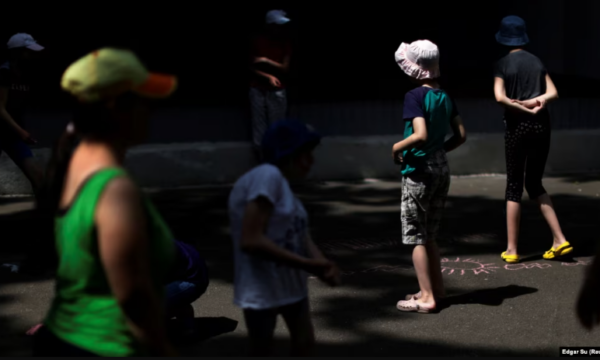
In Kosovo, the state provides child benefits, but not for everyone. Some of the most vulnerable – children without parental care – are left out of this scheme. Why?
Since 2021, the Government of Kosovo has started distributing monthly child allowances and, currently, over 400 thousand beneficiaries are beneficiaries.
Since July of last year, the value of this supplement is 20 euros for children in families with two children and 30 euros for those in families with three or more.
Excluded from this scheme are at least 28 children without parental care, aged 0 to 16, who live in SOS Children's Villages.
This social care organization says they are in constant contact with institutions, in an effort to find solutions.
"There is a willingness and understanding on the part of the Government for these children to be included in the support schemes," says Berat Kryeziu, from the Information Office of SOS Children's Villages, to Radio Free Europe.

In addition to them, children sheltered in families outside of their family do not receive the allowance, according to the Coalition of NGOs for Child Protection - KOMF.
Director Donjeta Kelmendi says that she has requested several times from the Government of Kosovo to create opportunities for this vulnerable category to benefit from financial support.
"They've said several times that they'll fix it, but they haven't," she says.
Radio Free Europe asked the Prime Minister's Office and the responsible ministries - Justice and Finance - about the number of children without parental care in Kosovo, the reasons for their non-inclusion in the supplement scheme and the possibility of their inclusion in the future, but received no response from either institution as of last week.
On July 2, the Ministry of Finance issued a public announcement, stating that it had approved the guidelines for the implementation of child and maternity allowances.
The updated guide states that, in cases where the child is in residential care, the application for benefits is made by an employee authorized by the entity, who opens a bank account for the child, where the benefits are deposited.
Contacted by REL after this announcement, SOS Villages officials say they do not have any official letter.
Why don't children without parental care benefit?
The main reason why children without parental care do not receive benefits seems to be related to the way the application process works.
The application is made through the Government of Kosovo's digital platform, e-Kosova, and must be completed by the child's mother.
The mother must provide some information, such as: her personal and child's number, first and last name, telephone number, place of residence, e-mail, and her bank account number.
In cases where the mother is deceased or does not live with the child, the father can apply for benefits.
"The current application process for allowances requires the application to be made by the parent – which, in the case of children under the care of SOS Villages, constitutes a technical challenge. It remains an obstacle to receiving allowances," says Kryeziu.
He adds that the expectations are that within a short period a concrete agreement will be reached, which would pave the way for the inclusion of these children in the scheme.
"We believe that, soon, this issue will take a positive direction," Kryeziu emphasizes, without providing further details.
What could be the solution?
Vebi Mujku, from the Institute for Social Policy Development, says that every child without parental care has a legal guardian who can legally represent them and apply for benefits on their behalf.
Mujku – former director of the Center for Social Work in Pristina – suggests that the money be transferred to a bank account opened in the child's name, and its use be enabled when he reaches adulthood, to support education or integration into independent life.
"The solution is very easy. Each child has a birth certificate and the funds can be paid retroactively from the date of birth to the present. Even though the amount is symbolic, it belongs to the child and should be in his account," Mujku tells Radio Free Europe.
Technical error or discrimination?
For Mujku, not including these children in the scheme is not only a technical error, but risks turning into open discrimination.
He emphasizes that children living in SOS Villages or in foster care receive basic services, but the lack of equal treatment in the supplement scheme conflicts with the principles of children's rights.
"I hope this happened unintentionally, because if it was intentional, then someone needs to be held accountable," says Mujku.

The same position is shared by Donjeta Kelmendi from the Coalition of NGOs for Child Protection - KOMF, who says that children without parental care are actually discriminated against in this process.
Radio Free Europe asked the Ombudsman Institution whether this exclusion constitutes a violation of human rights.
The response received states that this institution will investigate this issue and will contact the relevant institutions for more information.
"Only after the completion of the investigations will we be able to come up with specific findings, but, currently, this preliminary data shows that the non-payment of allowances risks violating the right of these children to equal treatment, guaranteed by the Law on Child Protection, among others," the Ombudsman's response states.
The Ministry of Justice did not provide an answer regarding the total number of children without parental care, namely those outside the allowance scheme.
According to data from 2023, provided by this ministry, there were a total of 529 people under the age of 18 without parental care and abandoned in Kosovo. /REL